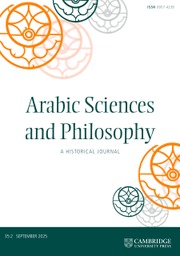Article contents
CHOSE, ITEM ET DISTINCTION : L’« HOMME VOLANT » D'AVICENNE AVEC ET CONTRE ABŪ HĀŠIM AL-ǦUBBĀ’Ī
Published online by Cambridge University Press: 10 August 2018
Abstract
This article explores the intimate connection between Avicenna's “flying man” argument and the theory of modes in the school of Abū Hāšim al-Ǧubbā’ī (d. 933). It shows that Avicenna borrows arguments developed originally by Abū Hāšim in order to demonstrate that a definite mode belongs to the living being as a whole (ǧumla). He argues for the incorporeality of soul on the basis of this departure from Aristotelian and Neoplatonic psychology and modal ontology. Here one sees Avicenna's subtle engagement with a thinker to whose writings he reacted critically, yet whom he very likely saw as one of the greatest metaphysicians to write in Arabic.
Résumé
Cet article se propose de mettre au jour les relations profondes qui existent entre l'argument de l’« homme volant » d'Avicenne et des considérations modales de l’école d'Abū Hāšim al-Ǧubbā’ī (m. 933). Il montre qu'Avicenne réemploie des arguments développés originellement par Abū Hāšim pour démontrer la présence d'un mode de la totalité (ǧumla) dans le cas du vivant – argument lui-même opposé à la psychologie aristotélicienne et néoplatonicienne – pour établir, contre l'ontologie modale de ce dernier, la nature incorporelle de l’âme. On voit ainsi se dessiner le jeu subtil d'Avicenne par rapport à celui qu'il avait très probablement identifié, fût-ce à son corps défendant, comme l'un des plus grands métaphysiciens de langue arabe.
- Type
- Research Article
- Information
- Copyright
- Copyright © Cambridge University Press 2018
- 1
- Cited by


